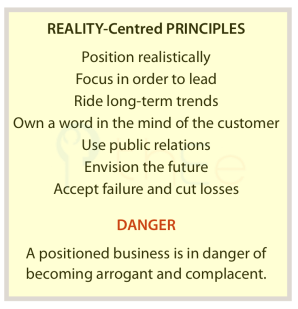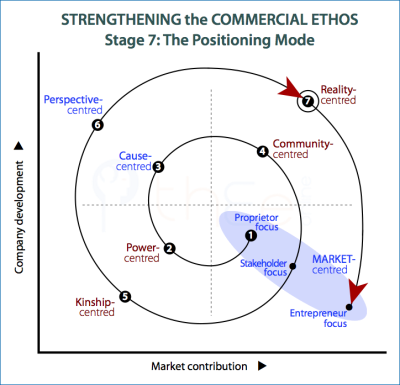Stage-7: The Positioning Mode
Injunction: Anticipate!
The market, and even the company, can never be captured by validated facts and historical statistics alone. So businesses must activate Reality-centred thinking in order to appraise markets usefully and position the business in a way that will be profitable.
(a) Reality-centred mentality.
(b) Reality-centred principles in a career development context.

|

|
Success depends on:
- Strategic positioning in the market.
- Identifying potentials in long-term demographic and social trends.
- Envisioning the future of the industry.
- Recognizing that the mind of the customer is the key.
- Using public relations effectively.
- Resourcing realistically.
- Accepting failure and cutting losses.
- Raising barriers to the entry of new competitors.
![]() Is product-centric? or is it market-centric? Or both?
Is product-centric? or is it market-centric? Or both?
Conclusion: The Entrepreneurial Mindset
The company once again spontaneously re-enters the domain, but now with maximal enhancement of : the business can be re-invented, management can make radical improvements and market leadership can flow from being first.
But success is dangerous. It breeds arrogance and complacency leading to disconnection from customers, related businesses and wider society. The company comes to believe its own hype: that its success is based on having a superb product or being a great company: and the media and hired consultants support it with flattery. Reality-centred principles offer the best antidote to this sort of arrogance and complacency: but it is not pleasant medicine.
Boards and senior management must understand that business is a tango, not a bull-fight: any success is a function of the firm’s interaction with the market.
Unless the entrepreneurial mind-set is maintained at all times, potentials for massive gains will be missed and the firm will become increasingly vulnerable over time.
-
Review the distinctive pressures during Stage transitions.
Originally posted: July 2009